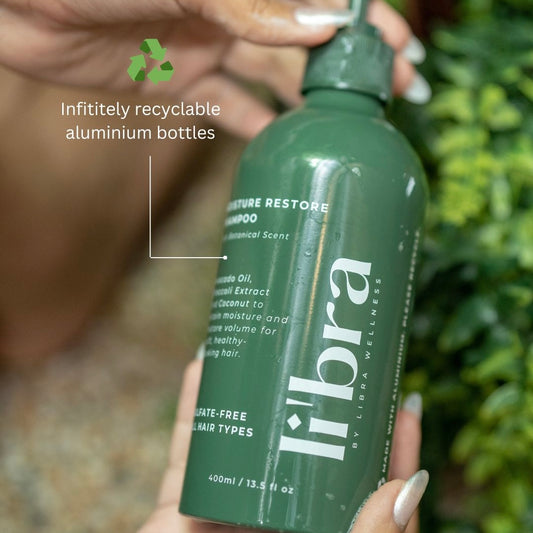
Eco Conscious Living: 5 Ways to Start
Share
Being "environmentally conscious" means you are a person who thinks about how your decisions and actions can impact the environment. While the concept may seem daunting at first, it certain doesn't have to be. You do not have to be the most educated environmentalist to adopt a more eco-conscious lifestyle or make more eco-friendly consumer decisions in your everyday life.
At Libra Wellness, we believe in starting small and making it attainable and sustainable for you — whatever that may look like. And we strongly believe that simple choices you make daily is impactful, and therefore it is a good place to start. Most importantly, remember that it does not have to be grand, expensive, or perfect.
Here are 5 simple things you can do TODAY to start a more environmentally conscious lifestyle:
1. Think before you buy. Overconsumption is a main factor that contributes to excessive waste and depletion of resources. So the next time you are thinking about buying something, ask yourself: "Is this something I need?" "Do I already have something at home that I could repair/repurpose?"
2. Say no to single-use plastic. I'm sure you've heard of the negative impact of plastic on the environment and our marine life. Refuse disposable plastic at grocery stores and restaurants. Bring your own reusable bags to stores, and containers and tiffins when you "tapao" or takeaway food.
3. Swap for everyday products with less toxins. Not only is it better for your health and wellness, it is less harmful to the environment. Switch to personal care and household products with readily biodegradable ingredients sourced from nature is an easy way to reduce toxins released to mother earth.
4. Switch to reusable period products. Speaking of personal care, if you are a menstruating person, consider switching to menstrual cups, reusable pads or use period underwear in place of disposable products like cotton pads and tampons. This is often times more convenient, comfortable, and economical than using single-use disposables.
5. Eat less meat. According to The Economist, compared to a standard serving size of 100g of vegetables, a 50g chunk of red meat is associated with at least 20 times as much greenhouse-gas emitted and 100 times as much land use. While it is impossible (and unrealistic) for most meat-eaters to completely give it up, cultivating habits like "Meatless Mondays," exploring vegetarian eateries and culinary joints, and seeking out other plant-based protein sources are all great steps in the right direction.
Conscious living requires a sense of awareness. When you are aware and taking action, that's when change happens. It doesn't need to be perfect or all-or-nothing; it just needs to be consistent and sustainable for the long run.
What eco-conscious actions are you interested in trying out?



